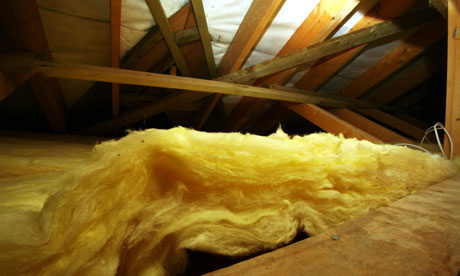Bill provides homeowners with up to £6,000 for insulation and places legal obligations on power companies to cut emissions

A flagship coalition policy to provide homeowners with thousands of pounds to make their properties more energy-efficient will be introduced to parliament today.
The energy security and green economy bill is expected to place legal obligations on power companies to cut the greenhouse gas emissions in their customers' homes. It is expected to allow the companies to offer incentives, such as holidays abroad, to encourage take-up of the "green deal" loans.
Chris Huhne, the secretary of state for energy and climate change, has signalled that other incentives to install energy-saving measures may include rebates on council tax bills or, in future, reductions in the stamp duty paid by homebuyers. Huhne has been working on the incentives with Downing Street's so-called "nudge unit" – the behavioural insight team.
Tesco, B&Q and Marks & Spencer are among the big brands that have held talks with the government about delivering the green deal, along with energy companies. The green deal is likely to see billions of pounds lent every year and to create new jobs. The government estimates that 14m of the UK's 27m homes would benefit from cavity, solid wall or loft insulation.
The energy used for heating rooms and water in the nation's buildings generates about 33% of the UK's carbon emissions and must be cut by 20% if the government is to meet its legally binding emissions targets. On Tuesday, the government's official advisers, the Committee on Climate Change, said a green deal that vastly improved home energy efficiency was one of the three key tests of the coalition's pledge to be the "greenest government ever", alongside delivering low-carbon energy and implementing ambitious targets for emissions cuts.
The Department for Energy and Climate Change (Decc) has indicated that a "golden rule" will apply to the loans made for energy-efficiency measures which dictates that the cost of the loan repayments will always be lower than the fuel bill savings delivered. The more expensive measures, such as solid wall insulation, appear by thegovernment's own figures to break the golden rule. But the new bill is expected to use powers from the Carbon Emissions Reduction Target – and possibly its expected 2013 replacement, the Energy Company Obligation (ECO) – to make energy suppliers balance the books.
The government hopes the green deal will allow householders without the money to fund energy-efficiency measures to gain access to upfront capital, expected to be capped at about £6,000. Those renting may get the power after 2015 to force landlords to install energy-efficiency measures. The green deal loans made are expected to be legally attached to the property, not the owner. This would mean that someone thinking about moving home would not be deterred from taking up the scheme by the prospect of not benefiting from the savings delivered by the work.
Campaigners have expressed concern that the involvement of private sector companies could make the scheme more expensive. They also insist that any incentives given – such as holidays – must not cancel out the emissions savings. Another concern is that without a robust quality assurance system and guarantees, householders may fear poor work carried out by "cowboy" builders.
No comments:
Post a Comment